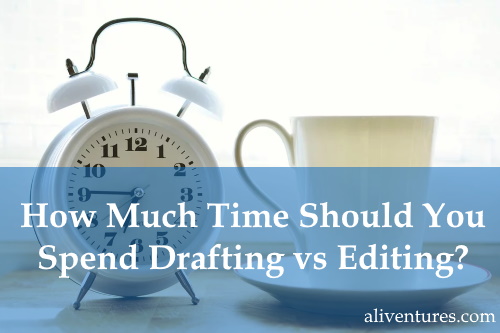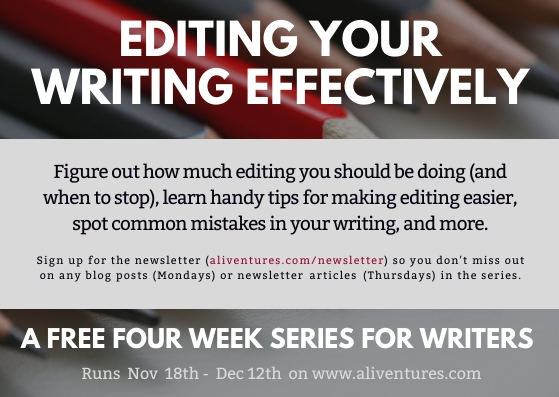How Much Time Should You Spend Drafting vs Editing?

This is the first post in a new four-week series on editing your writing: make sure you’re signed up for my (free!) weekly email newsletter so you don’t miss the next installment.
Whatever you’re writing, you’re going to need to spend some time editing. (Even a quick tweet will benefit from an extra glance.)
But how do you know whether you’ve struck the right balance between drafting and editing?
After all, spending two months drafting a novel then three years redrafting and editing probably isn’t a great way to work … but then, if you spend three years on the draft then just a couple of months doing a quick edit, that’s probably not quite right either.
In many cases, you’ll want to have a fairly good idea of how long both the drafting and the editing process are likely to take: for instance, you might want to line up an editor or beta-reader for your novel, or you might want to share the semi-edited version of your non-fiction book with some early reviewers.
So how do you strike the right balance? And do some types of writing need more editing than others?
While some writers tend to draft fast and redraft a lot, others draft slowly but do relatively little editing. That’s fine – so long as it works for you and results in a great finished piece (without you spending way longer than you want to on it).
Chances are, though, that you’ll find that your “drafting” to “editing” ratio varies from project to project – as there are a lot of factors that affect where you’re most likely to end up spending your time.
Factor #1: Fiction vs Non-Fiction
In my own writing, I’ve found that one key consistent factor in how much editing time I need is whether I’m writing fiction or non-fiction.
With fiction – particularly novels or novellas – I spend more than 50% of my time on editing. Usually, around 25% – 35% of my time goes on the first draft, and the remaining 65% – 75% is on all the redrafting and editing.
With non-fiction, though, I find this ratio is dramatically different – particularly if I’ve spent a while outlining. Something like 75 – 85% of my time goes on drafting, and around 15% – 25% on editing.
Why’s it so different? Fiction tends to be more complex, with more to get right. Plus, for me at least, I find it a lot easier to outline non-fiction books versus novels.
Factor #2: Length of the Project
Shorter writing projects will normally require a lower percentage of editing time, simply because they’re easier to get right first time round. If you plan and write a well-structured blog post, you might be able to get away with not much more than a quick proofread.
With long projects – particularly book-length ones – you’ll need to allocate more of your time to editing, because there are more moving pieces. Also, you may well find that because of the length of the project, you end up making mistakes or mis-steps in the first draft that you need to spend time unpicking.
Factor #3: Preparation / Outlining
If you spent a long time outlining your book or preparing for what you’re writing, then you might find that the first draft comes out relatively “clean” – maybe you’ll want to fix a few clunky sentences here and there, but you won’t be in the position of adding/removing huge sections.
I think some writers are more naturally drawn to outlining than others (and some, like me, find it easier for non-fiction than for fiction) – but it’s hard to deny that the more outlining you do, the less editing you’re likely to need to do.
Factor #4: Your Experience
If you’re a relatively new writer, you might find yourself spending a lot of time on editing – and that’s fine. It’s impossible to get everything right straight away, and it’s much better to get words down that you can later edit than to just stare at a blank screen.
I’ve been freelancing for over 11 years now (and writing fiction for even longer), and I’ve definitely found that as I’ve become more experienced, I’ve started spending less time on editing. With my freelancing, in particular, I’ve become much more efficient and planning and drafting over the years.
Factor #5: Your Drafting Speed
I tend to draft fairly fast, especially when it comes to fiction: I like to get everything down on the page. I don’t think that writing quickly is any better than writing more slowly – but slower writers are probably going to find that it’s easier to nail their paragraph or sentence first time round.
If you feel that your drafting speed isn’t working for you (whether you want to speed up or slow down), by all means experiment with changing it – but to some degree, you may find there’s a speed that you’re comfortable with and that you don’t want to change much.
Ultimately … there’s no “right” answer to how long you should spend drafting vs editing, and you’ll likely find that the ratio varies a lot depending on what particular project you’re working on.
If you’re looking for a (very) rough suggestion, though, I’d recommend:
- Fiction: spend at least 50% of your time editing
- Non-fiction: spend at least 25% of your time editing
If you’re tackling a big writing project for the first time, I’d allow an even higher percentage of time for editing.
With any large project, it’s a good idea to do several rounds of edits – sorting out big picture structural issues first, then turning to more detailed sentence-level editing (which we’ll be covering in next week’s blog post).

For the next four weeks, I’m going to be writing about editing on the Aliventures blog and in the newsletter. Make sure you’re signed up for the newsletter so you don’t miss those pieces (you’ll also get the Monday blog posts straight to your inbox, unless you opt out of those).
In this Thursday’s newsletter, we’ll be covering two simple tips to make editing your own work much easier, and in next Monday’s blog post, we’ll be going through some common sentence-level mistakes to watch out for when you’re editing.
About

I’m Ali Luke, and I live in Leeds in the UK with my husband and two children.
Aliventures is where I help you master the art, craft and business of writing.
Start Here
If you're new, welcome! These posts are good ones to start with:
Can You Call Yourself a “Writer” if You’re Not Currently Writing?
The Three Stages of Editing (and Nine Handy Do-it-Yourself Tips)
My Novels

My contemporary fantasy trilogy is available from Amazon. The books follow on from one another, so read Lycopolis first.
You can buy them all from Amazon, or read them FREE in Kindle Unlimited.

Hi Ali,
I mostly spend 60% of my time on writing a piece and 40% on editing it. Since I’m not a native speaker, so I have to be more careful.
What I do is that if I write a blog post today, I’d proofread it tomorrow, and then I’d make a few changes the day after tomorrow. The idea is that I get to work on my piece with a fresh mind, and it does wonders for me. It may not be an effective strategy for others, but it works for me.
Thanks for writing such a good blog post.
Hassaan Khan’s last blog post ..Does “Word-of-Mouth Marketing” Work for Freelancers?
That makes great sense, Hassaan — and I think leaving your blog post for a day is a really good idea. 🙂
Thank you Ali for your blogs.
They are so helpful and informative.
You have a way of taking the pressure off being a writer with the ‘It’s ok, everyone works differently approach. And the way you show examples of different approaches. Thank you so much.
Thanks Allan, I’m so glad you’re finding my posts helpful. 🙂 I think a lot of writing advice is really well-meaning, but can be quite pressuring when writers imply that you “should” be doing things a particular way. There are an awful lot of different ways to get from a blank page to a finished piece!
Best editing and drafting can make your book more valuable and interesting for readers. The tips you mentioned are quite helpful for new writers. Thanks for sharing it.
Thanks Jacob!